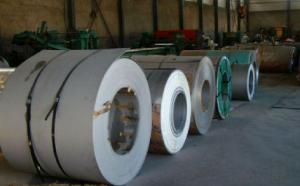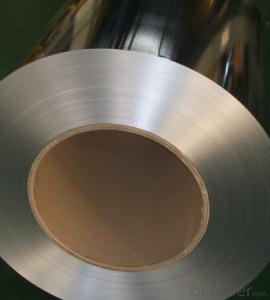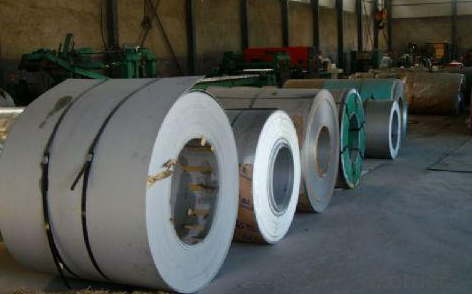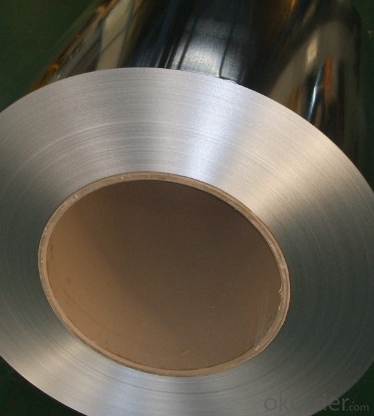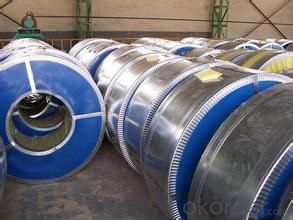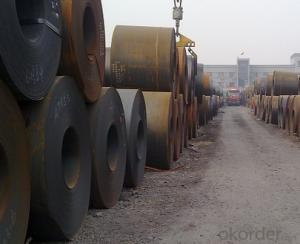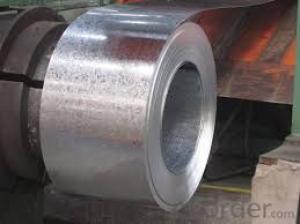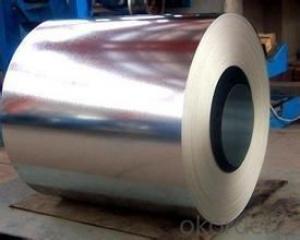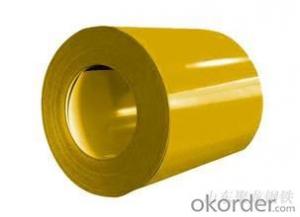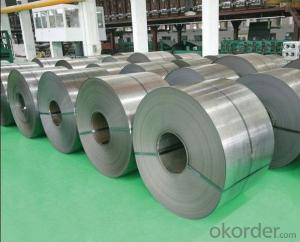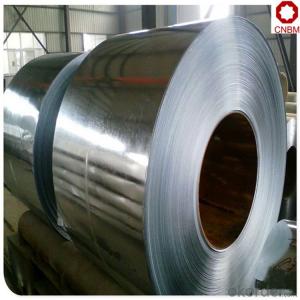Standard: AISI, ASTM, BS, DIN, GB, JIS, ASTM,JIS,BS
Grade: Dx51d+z,SGCC,DC51D
Thickness: 0.15--2.5mm
Type: Steel Coil, steel coil
Technique: Cold Rolled
Surface Treatment: Galvanized
Application: Container Plate
Special Use: High-strength Steel Plate
Width: 600--1500mm
Product: hot dipped galvanized steel coil
Zinc layer: 40--275g/m2
Spangle: large,regular,small,zero
I.D.: 508mm or 610mm
coil weight: 3-6tons
Galvanized Steel Coil Hot Dipped DC51D CNBM
- Loading Port:
- Guangzhou
- Payment Terms:
- TT OR LC
- Min Order Qty:
- 20 m.t.
- Supply Capability:
- 3000 m.t./month
OKorder Service Pledge
Quality Product, Order Online Tracking, Timely Delivery
OKorder Financial Service
Credit Rating, Credit Services, Credit Purchasing
You Might Also Like
1.Quick Details:
2.Packaging & Delivery
| Packaging Details: | standard package |
|---|---|
| Delivery Detail: | 1-4 week |
cold rolled galvanizing steel coil
galvanized iron steel coil
| Product name | hot rolling galvanized steel coil |
| Raw material | SGCC, SPCC, DC51D, SGHC,A653 |
| Certificate | ISO9001,BV,SGS |
| Thickness | 0.13mm-2.0mm |
| Width | 1250mm or under |
| Tolerance | thickness+/-0.01mm |
| Surface treatment | galvanized steel sheets |
T Bending (top-coating) T Bending (back-coating) | ≤3T ≤4T |
| Anti-MEK Wiping | ≥100times |
| Zinc coating | 40-180g |
| Type of coating structure | 2/1 or 2/2 coating, or customized |
| Standard | GB/T12754-2006, GB/T9761-1988, GB/T9754-1988, GB/T6739-1996, HG/T3830-2006, HG/T3830-2006, GB/T1732-93, GB/T9286-1998, GB/T1771-1991, GB/T14522-93 |
| Color | Silver |
| Application | construction material for building industry ,structural use, roofing, commercial use ,household appliance,industry facilities,office buildings |
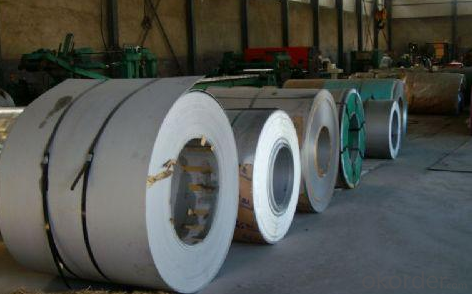
5.What is the application of Steel Coil?
There are two sides,one is out side: Workshop, agricultural warehouse, residential precast unit, corrugated roof, roller shutter door, rainwater drainage pipe, retailer booth;the other is inside: Door, doorcase, light steel roof structure, folding screen, elevator, stairway, vent gutter.
- Q: How are steel coils used in the manufacturing of automotive hoods?
- Steel coils are used in the manufacturing of automotive hoods as the primary raw material. These coils are processed and formed into the desired shape and size to create the hood. The steel's strength and durability make it an ideal choice for automotive hoods, providing protection and structural integrity to the vehicle.
- Q: Having a greater amount than 2% carbon in steel causes steel to suddenly become brittle. Why is this?
- Carbon fiber has better tensile capability then steel meaning its better while pulled aside. Plus you could mould the fiber to make autos-or homes-out of carbon fiber.
- Q: What are the applications of steel coils?
- Steel coils have a wide range of applications across various industries, such as construction, automotive, appliances, and manufacturing. They are primarily used in the production of sheet metal, pipes, and tubes, as well as for manufacturing parts and components. Steel coils are also used in the fabrication of various structures, including buildings, bridges, and infrastructure projects. Additionally, they find use in the production of household appliances, vehicles, machinery, and other consumer goods.
- Q: How are steel coils inspected for oil or rust residues using chemical analysis?
- Steel coils can be inspected for oil or rust residues using chemical analysis by first collecting samples from various parts of the coil. These samples are then analyzed using appropriate chemical techniques such as solvent extraction or acid digestion to extract any oil or rust residues present. The extracted substances can be further analyzed using methods like Fourier transform infrared spectroscopy (FTIR) or atomic absorption spectroscopy (AAS) to identify and quantify the specific contaminants. This chemical analysis allows for a thorough inspection of steel coils and helps ensure their quality and suitability for various applications.
- Q: What are the different methods of oiling steel coils?
- There exist multiple techniques for oiling steel coils, each possessing unique benefits and applications. Some commonly employed methods are as follows: 1. Immersion or bath oiling: This technique entails immersing the steel coils in an oil bath, typically passing them through a series of rollers to ensure an even and complete coating. Bath oiling is a cost-effective and efficient method for large-scale production as it allows for simultaneous oiling of multiple coils. It is commonly utilized for hot-rolled coils. 2. Roll-on oiling: As suggested by the name, roll-on oiling involves applying oil to the surface of steel coils using rotating rollers. This approach guarantees uniform oil distribution and is suitable for both cold-rolled and hot-rolled coils. Roll-on oiling is often preferred when precise control over the amount of oil applied is necessary. 3. Spray oiling: Spray oiling involves applying a fine mist or spray of oil to the coils using specialized nozzles or sprayers. This method allows for targeted application, making it suitable for specific areas or sections of the steel coils. Spray oiling is commonly employed for precision or specialty coils where controlling the oil quantity is crucial. 4. Electrostatic oiling: Electrostatic oiling entails applying a charged mist of oil particles to the steel coils. The coils are given an opposite charge, causing the oil particles to be attracted and adhere to the surface. This method ensures an even and controlled distribution of oil, minimizing waste, and reducing environmental impact. Electrostatic oiling is commonly used for high-quality or high-precision applications. 5. Brush or roller oiling: This technique involves manually applying oil to the coils using brushes or rollers. It is typically utilized for smaller-scale operations or when precision is required in specific areas. Brush or roller oiling allows for close control over the amount of oil applied. The selection of the oiling method depends on various factors, including the type of steel, desired level of oil coverage, production volume, and cost considerations. Each method possesses its own advantages and limitations, and manufacturers often choose the most suitable technique based on their specific requirements and objectives.
- Q: What are the different steel coil finishes available?
- Some common steel coil finishes include hot rolled, cold rolled, galvanized, and coated finishes.
- Q: I want to buy a machete made of 1055 carbon steel, and want to know if this steel is durable for repeated use, or even combat use.
- This Site Might Help You. RE: What is the level of dependability of 1055 carbon steel? I want to buy a machete made of 1055 carbon steel, and want to know if this steel is durable for repeated use, or even combat use.
- Q: Perform three sets of 15 repetitions several times a week and you will soon have buns of steel.
- Means you will have a nice booty, but the true question is... What does Buns of Steel mean by several times and SOON? Good luck.
- Q: What are the different methods of coil flattening for steel coils?
- Coil flattening for steel coils can be achieved through various methods, each having its own advantages and limitations. Some commonly employed techniques are as follows: 1. Roller leveling: By passing the steel coil through a series of rollers that exert pressure, this method flattens the coil. The rollers can be adjusted to achieve the desired level of flatness. Roller leveling is a versatile approach capable of handling a wide range of coil sizes and thicknesses. 2. Precision leveling: This method employs a more advanced leveling machine that applies pressure to specific areas of the coil to eliminate any waviness or defects. Precision leveling is commonly used for high-quality steel coils that require exceptionally flat surfaces. 3. Stretch leveling: Also known as tension leveling, this technique involves stretching the steel coil beyond its yield point, causing permanent deformation and flattening. Stretch leveling is frequently used for thinner gauge coils and effectively eliminates coil set and crossbow defects. 4. Temper rolling: This method subjects the steel coil to a controlled low-temperature heat treatment followed by cold rolling. The combination of heat and cold rolling helps relieve internal stresses and improve flatness. Temper rolling is particularly suitable for coils that require enhanced surface quality. 5. Laser flattening: This advanced method utilizes laser technology to selectively heat and flatten specific areas of the coil. Laser flattening is highly precise and capable of correcting localized defects or unevenness. However, due to its higher cost, it is typically used for smaller coils. It is essential to consider various factors, such as desired flatness requirements, coil dimensions, material properties, and production budget, when selecting the most appropriate coil flattening method.
- Q: I want a stainless steel refrigerator that doesn't leave fingerprints and I'm looking on Lowe's website but they have too many choices and i don't have a clue what they are. The have stainless, stainless look, stainless steel, monochromatic satina, and monochromatic stainless steel. Can anyone tell me what the heck those mean? lol
- Stainless Look vs Stainless in refrigerators usually refers to true Stainless Steel versus Satina. There's pluses and minuses both ways actually. With true Stainless, you have the exact match to the rest of the kitchen (because Satina is only used on refrigeration), but it is more prone to fingerprints, and is not magnetic. The Satina finish has a good look when not directly near a Stainless appliance, and does not show fingerprints and will accept magnets, but is not an exact match to stainless. My usual recommendation is that if you have a kitchen full of Stainless products, stick with the true Stainless Steel. If the refrigerator is more isolated, or is the only thing you want to have a Stainless look, you may want to consider Satina. If you put a lot of magnets on the refrigerator, I'd also recommend to go Satina. And since you don't want fingerprints, the Satina steel might come to your liking.
Send your message to us
Galvanized Steel Coil Hot Dipped DC51D CNBM
- Loading Port:
- Guangzhou
- Payment Terms:
- TT OR LC
- Min Order Qty:
- 20 m.t.
- Supply Capability:
- 3000 m.t./month
OKorder Service Pledge
Quality Product, Order Online Tracking, Timely Delivery
OKorder Financial Service
Credit Rating, Credit Services, Credit Purchasing
Similar products
Hot products
Hot Searches
Related keywords
